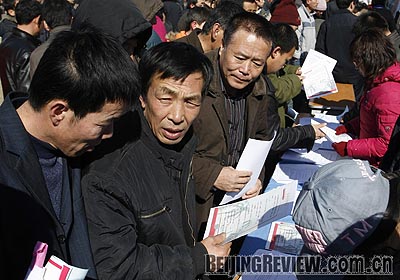|
The U.S.-led global financial turmoil is weighing down China's real economy, which has relied heavily on exports of labor-intensive products for growth. China's employment suffers when the world economy succumbs to a recession. A large number of migrant workers in southeastern coastal areas are returning home because of factory closures and production suspension. Du Yang, a labor expert at the Institute of Population and Labor Economics under the Chinese Academy of Social Sciences, published an article in China Finance that argued boosting employment, especially in rural areas, should be the primary goal of economic recovery. Edited excerpts follow:
 |
|
JOB HUNTING: The government of Yushu County in Jilin Province holds a job fair for returning migrant workers on March 10 (SHAO SHOUZHI) | Both central and local governments have made a series of policies to stimulate economic growth amid the global economic downturn. But those policies do not offer detailed measures to expand employment. In my opinion, an economic stimulus package that does not take into consideration job creation cannot root out the negative influence imposed by the financial crisis.
As China merges into economic globalization, any outside blow will cause sharp fluctuations in the Chinese economy, which can also be reflected in the labor market.
The 1997 Asian financial storm, a smaller version of this round of financial crisis, resulted in deteriorating economic growth and rising job losses. The Chinese Government at that time adopted active employment policies while in the meantime perfected the urban social security system.
The current financial turmoil has engulfed the Chinese labor market in the same predicament. Worse still, the crisis originated in developed countries, which absorb most of the cheap "made-in-China" products, hence taking a toll on labor-intensive Chinese producers.
However, this time, instead of urban employees, migrant workers who have relocated to the southeastern coastal regions have suffered the most from the destructive financial crisis. They not only have lost their low-paying jobs, but also are not covered by the social security network, adding uncertainty to social stability.
Unemployment imposes direct negative impacts on people's livelihoods, giving rise to social instability if a huge number of people cannot make ends meet because of job losses.
As a result, job growth should be at the top of the macro-control agenda.
In the government stimulus plans, more money seems to be allocated to infrastructure construction and large conglomerates. Those are useful to boost investment but will not effectively increase jobs or expand consumption.
To achieve an economic recovery with job growth, more stimulus measures should be granted to small and medium-sized enterprises (SMEs), which are important absorbers of excessive labor in many economies.
More financial support should be given to SMEs to create a better development environment for them such as relieving their tax burden and increasing credit support if they are beset by financial problems.
Perfecting social security
To better survive the financial turbulence, we should combine active job expansion with optimized social security.
Last December, the Central Economic Work Conference proposed to "implement a proactive employment policy," which was right in time to tackle unemployment. A decade ago, we successfully weathered the Asian financial storm by actively expanding employment. This time, employment expansion must focus on the group that has been hit the hardest by the crisis-migrant workers.
| 